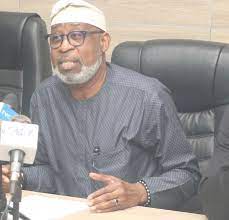The Federal Government has disclosed that it is currently reviewing regulations in the nation’s mining sector, particularly those relating to the mining of lithium minerals in view of the increasing interests of foreign mining companies in the minerals.
As part of the regulatory measures, it maintained that no company would be allowed to mine and export raw lithium from the country unless they set up processing and refining plants in Nigeria.
The Minister of Solid Materials, Dele Alake, who gave these hints at the 2023 Nigeria Mining Week event in Abuja, promised that government would do everything possible to discourage the carting away of the nation’s solid minerals without value addition.
According to him, the mining industry is being modernized and government is planning more than $19.6 million (about €18.6mn) investment between now and 2030 to generate data on the mining sector through the National Integrated Mineral Exploration Project (NIMEP).
The minister disclosed that preliminary reports from the project had indicated massive discoveries which have put Nigeria on the world map of lithium-rich countries, stressing that the regulatory regime would help Nigeria avert the current experiences in the oil producing communities in terms of environmental degradation and other hazards.
He explained: “I want to emphasize the fact that the era of exporting raw solid minerals from Nigeria is over. Any company wishing to come and invest in the solid minerals industrial sector in Nigeria henceforth must add local value.”
Alake pointed out that with revised licensing requirements, mining companies must show business plans that benefit local communities before being granted licenses for job creation, adding that such an initiative is already on stream as some companies have already commenced operations in Nigeria.
In his remarks, the President of the Miners Association of Nigeria, Dele Ayanleke, noted that despite the existing regulations, the health and safety risks associated with mining newly discovered materials were not always addressed by miners
He explained that whenever there was a discovery of a new mineral, artisanal miners in the country would conduct their mining operations without taking steps to tackle those risks, adding that lamentably governmental agencies that should implement the regulations often fail to end such activities.
Also, an Abuja-based geological consultant, Nafisatu Mohammed Sani, clarified on how best to operate in the mining sector without destroying the environment and charged operators to always adhere to the guidelines on mining activities.
She said: “When mining, you need to protect the environment. How do we protect the environment? There are five ways to make mining more sustainable: lower impact mining techniques, reusing mining waste, eco-friendly equipment, rehabilitating the mining site, and shutting down the illegal mining site.”,
Currently, Ganfeng Lithium Industry Limited, a Chinese company, has commenced the building a lithium processing plant in the central Nasarawa State with a capacity to process about 18,000 tons of lithium ore per day to manufacture batteries for electric vehicles. The government said this is an example of the desired type of investment.
To improve the mining sector’s contribution to the nation’s GDP, industry experts have advised the Federal Government to intensify its drive to combat illegal mining activities that destroy the environment.
Lithium is used in the production of rechargeable batteries and electric vehicles and it has been discovered in commercial quantity and being mined in Nasarawa, Kogi, Kwara, Ekiti, and Cross River States.






